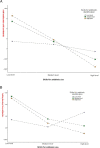The moderating effect of parental skills for antibiotic identification on the link between parental skills for antibiotic use and inappropriate antibiotic use for children in China
- PMID: 36690967
- PMCID: PMC9872431
- DOI: 10.1186/s12889-023-15099-8
The moderating effect of parental skills for antibiotic identification on the link between parental skills for antibiotic use and inappropriate antibiotic use for children in China
Abstract
Background: Inappropriate antibiotic consumption promotes antibiotic resistance. However, findings on the association between antibiotic-related knowledge and behaviors are inconsistent and contradictory, resulting in unjustified guidance of interventions. The mechanisms between the different kinds of antibiotic-related skills contained in knowledge modules in some previous studies are indistinct and rarely studied.
Methods: A cross-sectional survey was conducted between June 2017 and April 2018 in three Chinese provinces, investigating 9526 parents with children aged 0-13 years old. Data from 1944 parents who self-medicated their children and 2478 respondents whose children sought care were analyzed.
Results: Skills for antibiotic identification were found to be a moderator for the association between skills for antibiotic use and two inappropriate behaviors. Compared with parents with low levels of both skills for antibiotic identification and use, those mastering both skills at either medium (OR = 0.48, 95% CI [0.26-0.88]) or high (OR = 0.15, 95% CI [0.07-0.34]) level were less likely to self-medicate their children with antibiotics. Parents with a medium level of skills for antibiotic identification and high level of skills for antibiotic use (OR = 0.18, 95% CI [0.08-0.44]) and those with a high level of both skills (OR = 0.15, 95% CI [0.05-0.47]) were less likely to ask doctors for antibiotics when seeking care.
Conclusion: Parents' high level of skills for antibiotic identification is revealed to promote inappropriate antibiotic use when parents master a low level of skills for antibiotic use. Conversely, based on excellent skills for antibiotic use, better skill for antibiotic identification is associated with a greater reduction in inappropriate behaviors. We recommend future health education to strengthen skills for antibiotic identification along with guidance on antibiotic use.
Keywords: Antibiotic identification; Antibiotic use; Children; Self-medication; Skill.
© 2023. The Author(s).
Conflict of interest statement
The authors declare that they have no competing interests.
Figures


Similar articles
-
Large-scale survey of parental antibiotic use for paediatric upper respiratory tract infections in China: implications for stewardship programmes and national policy.Int J Antimicrob Agents. 2021 Apr;57(4):106302. doi: 10.1016/j.ijantimicag.2021.106302. Epub 2021 Feb 12. Int J Antimicrob Agents. 2021. PMID: 33588014
-
Parental self-medication with antibiotics for children promotes antibiotic over-prescribing in clinical settings in China.Antimicrob Resist Infect Control. 2020 Sep 7;9(1):150. doi: 10.1186/s13756-020-00811-9. Antimicrob Resist Infect Control. 2020. PMID: 32894189 Free PMC article.
-
Knowledge, attitudes, and practices of parents in rural China on the use of antibiotics in children: a cross-sectional study.BMC Infect Dis. 2014 Feb 27;14:112. doi: 10.1186/1471-2334-14-112. BMC Infect Dis. 2014. PMID: 24576064 Free PMC article.
-
Prevalence of antibiotic self-medication behavior and related factors among children aged 0 to 5 years.Expert Rev Anti Infect Ther. 2021 Sep;19(9):1157-1164. doi: 10.1080/14787210.2021.1882303. Epub 2021 Feb 19. Expert Rev Anti Infect Ther. 2021. PMID: 33507127 Review.
-
Eliciting parents' decision-making to antibiotic use for upper respiratory tract infections: A discrete choice experiment.J Glob Health. 2024 Dec 9;14:04220. doi: 10.7189/jogh.14.04220. J Glob Health. 2024. PMID: 39651656 Free PMC article.
Cited by
-
Knowledge, Attitudes, and Practices of Iraqi Parents Regarding Antibiotic Use in Children and the Implications.Antibiotics (Basel). 2025 Apr 3;14(4):376. doi: 10.3390/antibiotics14040376. Antibiotics (Basel). 2025. PMID: 40298563 Free PMC article.
References
-
- Organization, W. H. Ten threats to global health in 2019. 2019. https://www.who.int/vietnam/news/feature-stories/detail/ten-threats-to-g....
-
- Organization WH. Who global strategy for containment of antimicrobial resistance. Wkly Epidemiol Rec. 2001;76(38):298–299.
Publication types
MeSH terms
Substances
LinkOut - more resources
Full Text Sources
Medical
Miscellaneous

